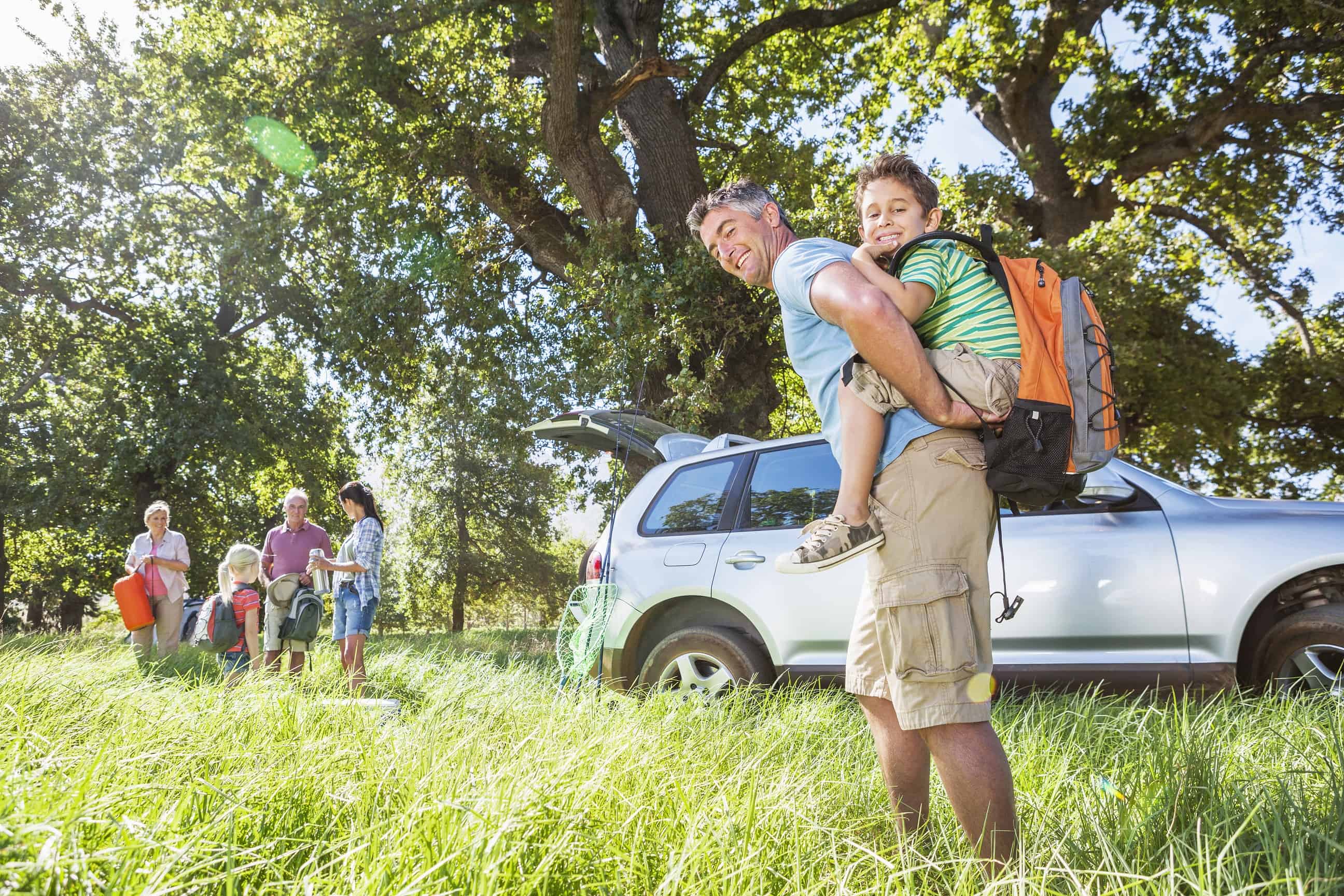Sponsored by

The spring thaw has us biting at the bit. As soon as that mercury begins to rise, all we want to do is load up the car and hit the road. It doesn’t much matter where we’re headed either; the sun pulls us back into nature like a moth to a flame. It could be camping, backcountry hut-to-hut hiking or escaping to the family cottage.
For my family, spring sees us cruise up the highway to the lake cabin. It’s a perennial exercise in remembering what to bring and how to pack it all in the car. It’s a new puzzle every year; how to accommodate new pets, new extended family members, new babies and their accessories. But some things never change; some things you can always count on. You can always expect to forget something; you can bank on more cars on the highway; you can count on sticky toddler hands pawing at little sister in the back seat.
To inject a little more sanity, safety and bliss into your trip, let us lend a hand with the planning. Swipe our best tips, hacks and planning prep for your rustic retreat.
Start with a Plan
Plan your route:
- Which roads will you take?
- Would a printed map be handy?
- Consider the locations of gas stations and rest facilities along the intended route.
- Is there an alternate route should traffic be unexpectedly heavy?
- Decide who will drive and who will navigate
Do you have reliable communications?
 Globalstar, SPOT Gen3
Globalstar, SPOT Gen3
-
Is there cell phone coverage along the planned route?
-
Do you have a reliable communications device that works beyond cellular?
-
Can you call or signal for help if you can't find a cell phone signal?
Vast areas of Canada, including long stretches of highways, are either unreliable for cellular coverage or cellular dead zones. Are you prepared for the unexpected? If you - or another person – runs into trouble, do you have a reliable communications device that operates if cellular isn’t available? Do you have a way to check-in with friends or family back home and enable them to track your progress online? Have you planned for an alternate route in case something leads you off-course? Planning ahead for these and other unexpected situations could make all the difference.
The SPOT Gen3 GPS Satellite Messenger works virtually anywhere in the world. At the push of a button, you can let family and friends know you're OK or send emergency responders your GPS locations. You can pre-set your device to send tracks at the speed of your adventures, so friends and family can monitor your progress online. You can also pre-program text messages that will share your status and GPS coordinates (or an e-mail with a link to Google Maps) with up to 10 pre-determined contacts using the check-in function. If there is a change to your original route, tracking ensures your friends and family can follow your progress and monitor your location online, in near real-time. If a pre-planned check-in signal is missed, or they if they receive an alert from you, they'll know to send help.
The SPOT Global Phone is a satellite phone designed for outdoor enthusiasts. It provides affordable satellite connectivity when cell networks are unreliable or not existent. Affordable, lightweight and easy to use it also provides data access to follow up on that last thing that needed done at the office. Whether you’re boating on the lake, paddling the river or cruising down the highway, SPOT Gen3 and SPOT Global Phone provide a reliable, life-saving line of communication completely independent of cellular.
Restoring peace of mind…now isn’t what nature is all about?
Check the weather ahead of time
- Driving to the cabin in wet conditions is a drastically different experience than clear and sunny.
- If you're camping, carefully consider at what point bad weather compromises your trip. Are showers simply 'unpleasant' or do they pose a risk to your safety.
Planning Tips
1 Week before you go:
- Don’t pack the day you depart. Start building a list of what you will need the week or two before you leave. Make a proper list too – put pen to paper or make a digital note in your phone. Mental notes are much less sticky.
- Plan your wardrobe and catch up on laundry. When it comes to packing, it’s easier done when plucked straight from the closet. Remember weather, adventure and environment sensible footwear.
- If you own your cabin, think about the tasks you’ll be doing. Do you have all the tools, equipment, cleaning supplies (etc.) you need to open, clean, landscape or repair the cabin?
- If you’re renting a cabin, do you know which items are explicitly included (or excluded) in your agreement? Print our list above and then brainstorm anything else you may need. What about niche items like towels, cooking oil or a baby bed?
- Buy non-perishable goods in bulk in the city and transport what you have space for; toilet paper, paper towel, bottled water, and laundry detergent can be pricey at smaller retailers in cabin country.
- If you’re camping – does your site have a picnic table? Is firewood supplied? Do the washrooms have toilet paper? Where can you get drinking water?
- Clean out the cooler
- Make or buy ice
- Load up on some reading materials – newspapers, magazines, a book – or a podcast for the drive.
What to pack?
Hack your packing list:
Print our Master Checklist - Camping edition
Print our Master Checklist - Cabin edition
Remember to pack:
Essential Electronics
- Camera, camera accessories (memory card, battery charger, additional lenses)
- Cell phone, charger
- Going off the grid? Compass, GPS, SPOT Gen3, solar charger, extra batteries and/or satellite devices
Preparing the vehicle for the drive:
 Adobe Photostock
Adobe Photostock
- Clean out the car from front to back.
- Prepare healthy snacks the day before you leave. Peel and cube fruit, and portion out dry snacks like crackers into bags or containers. Small soft-sided coolers for chilled snacks are easily stored at the front passenger’s feet.
- Bring water for the drive
- Need extra space? Consider a car-top luggage carrier
- To make packing the car easier, remove items from original boxes or packaging. Load multiple items into tubs or soft sided bags to maximize space.
- Stock the car with a garbage bag and baby wipes.
- Place anything you may want during the trip within arm’s reach (magazines, food, wipes, sunscreen, etc.)
- Check to see if you can see out the back window before you pull away.
- Pack non-essential items first. When you arrive, the items you need most are handy.
En route:
Driving to destination
When you can, avoid driving during peak hours. You’ll bypass congestion which means parents, pets and the kiddos won’t be sitting in traffic under a stale mid-afternoon sun.
Sadly, summer weekends can be deadly for highway driving accidents. Drive with care, watch for wildlife, and be patient.
Follow a traffic reporting Twitter account. While it will only work where you get a signal, you’ll get crowd-sourced updates in a timely manner.
Do you have any advice or tricks for getting camp or cabin-ready?
Tweet us your best tip, or leave us a comment below!
 This article was brought to you by Globalstar Canada Satellite Co, distributors of SPOT Gen3, SPOT Trace and SPOT Global Phone. SPOT will keep you connected to the people and things that matters most, including emergency services, using the world's most modern satellite network. For peace of mind wherever trails lead you, including beyond the cellular grid, pick up a SPOT satellite device. Limited time offer! SPOT devices now 50% off, visit findmespot.ca for details.
This article was brought to you by Globalstar Canada Satellite Co, distributors of SPOT Gen3, SPOT Trace and SPOT Global Phone. SPOT will keep you connected to the people and things that matters most, including emergency services, using the world's most modern satellite network. For peace of mind wherever trails lead you, including beyond the cellular grid, pick up a SPOT satellite device. Limited time offer! SPOT devices now 50% off, visit findmespot.ca for details.
Related content on Canadian Traveller



